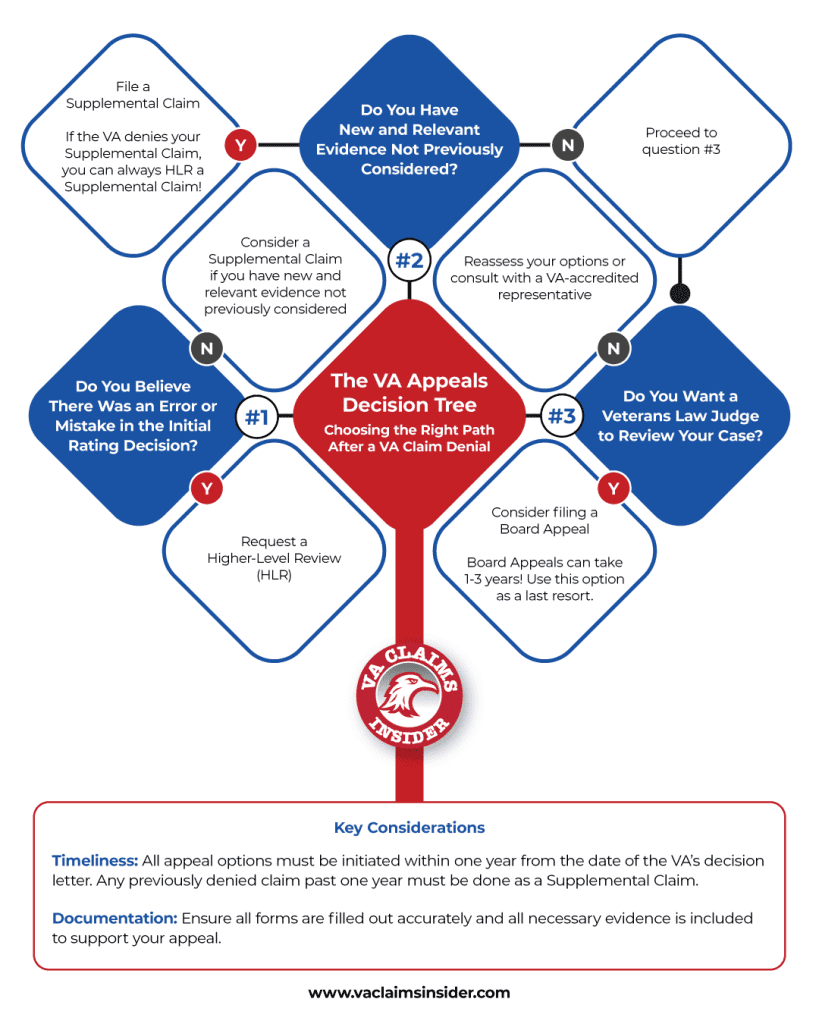Looking for Expert-Level VA Claim Answers?📱Call Us Now! 737-295-2226
Navigating the complexities of the VA disability claims process can be daunting, especially when faced with a VA claim denial.
However, understanding the available avenues for appeal can empower you to take decisive action toward securing the VA benefits you’ve earned.
In this expert-level guide from Brian Reese, the VA Claims Insider, we’ll explore a decision tree to help you determine the best path forward after a VA disability claim denial, complete with examples to illustrate each option.
Let’s begin!
Summary of Key Points
- Three primary appeal options exist after a VA disability denial: Veterans can choose between a Higher-Level Review (HLR) for a fresh review without new evidence, a Supplemental Claim if they have new and relevant evidence, or a Board Appeal for a review by a Veterans Law Judge.
- Higher-Level Review is best if you believe the VA made an error. A more experienced reviewer will reconsider your claim without adding new evidence, and you can request an informal conference to discuss the case.
- A Supplemental Claim is necessary if you have new and relevant evidence. This could include medical records, private evaluations, or Nexus Letters that strengthen your claim and provide missing proof of service connection.
- A Board Appeal is the final step for veterans who want a judge to review their case. You can opt for a direct review, submit additional evidence, or request a hearing, depending on how much new information you wish to present.
Understanding Your VA Appeal Options
Upon receiving a denial or an unfavorable rating decision from the VA, you have three primary appeal options to consider:
- Higher-Level Review (HLR)
- Supplemental Claim
- Board Appeal
Each option serves a specific purpose and is suited to particular circumstances.
Let’s explore each one to understand which might be the best fit for your situation.
#1. Higher-Level Review (HLR)
When to Choose HLR:
- VA Error or Mistake: If you think the VA made a mistake in evaluating your claim based on the evidence already submitted.
- No New Evidence: When you don’t have additional evidence to present but believe the decision was incorrect.
HLR Process:
- Request Submission: File a Higher-Level Review (HLR) by submitting VA Form 20-0996 within one year of the decision date.
- De Novo Review: A senior reviewer will re-examine your claim without considering the previous decision, providing a fresh perspective.
- Optional Informal Conference: You can request a one-time informal conference to discuss your case with the reviewer.
Example:
John, a Navy veteran, applied for disability benefits due to tinnitus resulting from his service. His claim was denied, stating no “nexus” for service connection. Believing this to be an error, as his service records documented exposure to loud machinery, John opted for a Higher-Level Review. The senior reviewer acknowledged the oversight and granted service connection for his tinnitus. No new evidence was submitted or reviewed.
#2. Supplemental Claim
When to Choose a Supplemental Claim:
- New and Relevant Evidence: If you have obtained new and relevant evidence that wasn’t previously considered and could potentially change the outcome of your claim.
Supplemental Claim Process:
- Filing: Submit a Supplemental Claim using VA Form 20-0995 within one year of the decision date to maintain your effective date.
- Evidence Submission: Along with the form, provide the new and relevant evidence supporting your claim.
- VA’s Duty to Assist: The VA is obligated to help gather additional evidence if necessary.
Example:
Maria, an Army veteran, was denied benefits for PTSD due to insufficient evidence linking her condition to her service. After the denial, she started receiving treatment from a private psychologist who provided a detailed report connecting her PTSD to a traumatic event during her deployment. She also received a private Mental Health Evaluation and IMO with a “nexus” linking her PTSD to service. Maria submitted this new and relevant evidence through a Supplemental Claim, leading to the approval of her benefits.
#3. Board Appeal
When to Choose a Board Appeal:
- Disagreement with Prior Decisions: If you’re not satisfied with the outcomes of the previous decision reviews or prefer a Veterans Law Judge to assess your case.
- Desire for a Hearing: If you wish to present your case in person or via a virtual hearing.
Options Within a Board Appeal:
- Direct Review: No new evidence is submitted; the judge reviews the existing record.
- Evidence Submission: You can submit new evidence for the judge’s consideration.
- Hearing: Request a hearing to provide verbal testimony and possibly submit new evidence.
Process:
- Filing: Submit a Notice of Disagreement (NOD) using VA Form 10182 within one year of the decision date.
- Selection of Docket: Choose between Direct Review, Evidence Submission, or Hearing, each with different timelines and procedures.
Example:
David, a Marine Corps veteran, had his claim for a back injury denied twice, even after submitting new and relevant evidence. Unsatisfied with the decisions, he filed a Board Appeal and requested a hearing. During the hearing, David provided detailed testimony about his injury and its impact on his life. The Veterans Law Judge found his testimony credible and granted the benefits.
VA Appeals Decision Tree: Choosing the Right Path
To visualize the decision-making process, consider the following decision tree, starting in the middle:

Do You Believe There Was an Error or Mistake in the Initial Rating Decision?
- Yes: Request a Higher-Level Review (HLR).
- No: Consider a Supplemental Claim if you have new and relevant evidence not previously considered.
Do You Have New and Relevant Evidence Not Previously Considered?
- Yes: File a Supplemental Claim. Pro Tip: If the VA denies your Supplemental Claim, you can always HLR a Supplemental Claim!
- No: Proceed to the next question.
Do You Want a Veterans Law Judge to Review Your Case?
- Yes: Consider filing a Board Appeal. Pro Tip: Board Appeals can take 1-3 years! Use this option as a last resort.
- No: Reassess your options or consult with a VA-accredited representative.
Key Considerations
- Timeliness: All appeal options must be initiated within one year from the date of the VA’s decision letter. Any previously denied claim past one year must be done as a Supplemental Claim.
- Representation: Consider seeking assistance from a VA-accredited attorney or representative to navigate the appeals process effectively.
- Documentation: Ensure all forms are filled out accurately and all necessary evidence is included to support your appeal.
Conclusion & Wrap-Up
Facing a denial of your VA disability claim can be disheartening, but understanding and utilizing the appropriate appeal avenues can make a significant difference.
By carefully assessing your situation, gathering necessary evidence, and choosing the right path—be it a Higher-Level Review (HLR), Supplemental Claim, or Board Appeal—you can enhance your chances of securing the benefits you’ve earned through your service.
Remember, the VA appeals process is designed to be veteran-friendly, offering multiple opportunities to present your case.
Stay informed, be proactive, and don’t hesitate to seek professional guidance to navigate this journey successfully.
And remember this fellow veterans: YOU SERVED! YOU DESERVE!
VA disability benefits are not a handout; you’ve earned them through your honorable service.
If you’re feeling stuck, frustrated, and underrated by the VA, you don’t need to fight this battle alone.
At VA Claims Insider, we’re here to help you maximize your benefits and secure the compensation you rightfully deserve.
WE’VE GOT YOUR SIX!
We’ve helped 25,000+ veterans increase their VA rating—YOU could be next!
If you need expert help navigating the VA claims process, our team of VA claim coaches is ready to educate and empower you to victory!
✅ If you’re sick and tired of waiting and want expert guidance to get the VA rating and compensation you deserve faster, CALL US RIGHT NOW at 737-295-2226 for a no-obligation VA claim consultation!
Need Expert-Level Help With Your VA Claim? WE GOT YOUR SIX!
How does VA Claims Insider help veterans?
We make the confusing and frustrating VA claim process EASY through our 8-step proprietary system and one-on-one coaching; we’re the VA Claim EXPERTS you can trust, and YOU are never alone in this fight against the VA!
You’ll also receive VA disability expert Brian Reese’s SEM Method Blueprint—a proven formula that has helped over 25,000 veterans win their VA disability claims faster:
Strategy + Education + Medical Evidence = VA Rating and Compensation You Deserve FASTER!
Start today and unlock an exceptional level of service you deserve for serving our country:
➡️ You’ll hear from a VA Claim Expert over email within 15 minutes of signing up today.
➡️ You’ll hear from your Veteran Coach team within 24 hours of all inquiries during normal business days/hours.
➡️ Our terms are simple: IF WE DON’T WIN, YOU DON’T PAY. You have nothing to lose and everything to gain!
Click the red button below to start the process of winning your VA claim right now:
Fellow Veterans: Are You Ready to WIN, SERVICE-CONNECT, and INCREASE Your VA Disability Rating FASTER? We Can Help!

- VA Claims Insider is the #1 most trusted name in VA disability claims.
- Work directly with a VA claims coach who can help lead you to VA claim victory.
- 25,000+ disabled veterans served in our membership programs since 2016.
- 30% average rating increase for veterans who complete our #1-rated Elite program.
- 4.7/5.0 average rating out of 5,500+ total reviews; over 4,500 5-star reviews.
About the Author

Brian Reese
Brian Reese is a world-renowned VA disability benefits expert and the #1 bestselling author of VA Claim Secrets and You Deserve It. Motivated by his own frustration with the VA claim process, Brian founded VA Claims Insider to help disabled veterans secure their VA disability compensation faster, regardless of their past struggles with the VA. Since 2013, he has positively impacted the lives of over 10 million military, veterans, and their families.
A former active-duty Air Force officer, Brian has extensive experience leading diverse teams in challenging international environments, including a combat tour in Afghanistan in 2011 supporting Operation ENDURING FREEDOM.
Brian is a Distinguished Graduate of Management from the United States Air Force Academy and earned his MBA from Oklahoma State University’s Spears School of Business, where he was a National Honor Scholar, ranking in the top 1% of his class.



